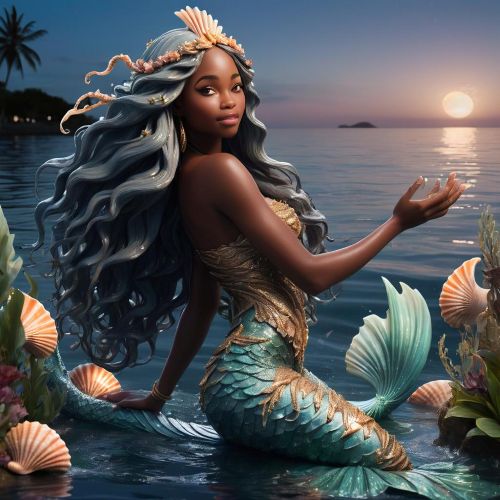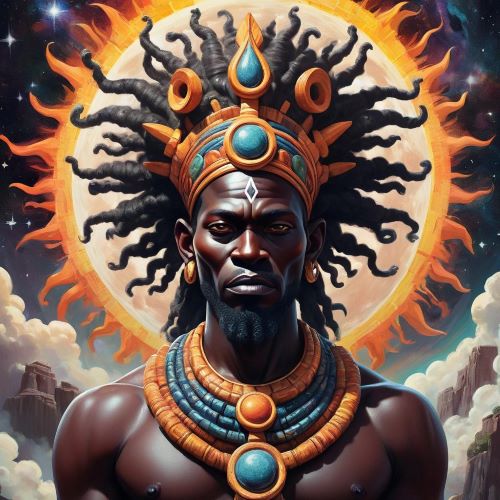Mbundu Gods
Mbundu Gods are central figures in the mythology and spiritual beliefs of the Mbundu people of Angola. Revered as powerful beings who govern the natural and supernatural realms, these deities are believed to influence every aspect of life, from the cycles of nature to human destiny. Mbundu Gods are often depicted with unique attributes and powers that reflect their roles as creators, protectors, or arbiters of justice. Through their myths, the Mbundu people convey moral lessons, cultural values, and a deep understanding of the interconnectedness between humans, nature, and the spiritual world.
In Mbundu mythology, gods are often associated with natural elements and sacred sites. Some deities preside over the sky, rivers, forests, or mountains, emphasizing their control over both the environment and human livelihood. These gods are believed to ensure fertility, health, and prosperity, rewarding communities that show reverence and moral conduct. Others act as guardians or judges, intervening in human affairs to uphold justice or punish wrongdoing. Their presence in myths underscores the importance of maintaining harmony with nature and the divine, illustrating that the well-being of people and the land are intrinsically linked.
Mbundu Gods are depicted with symbolic attributes that convey their divine powers and influence. Some possess the ability to create life, control weather, or manipulate natural forces, demonstrating their supreme authority. Others are depicted as wise and just, providing guidance to humans or mediating conflicts between mortals and spirits. These deities often serve as central figures in creation myths, origin stories, and moral tales, offering explanations for the world’s mysteries and reinforcing cultural teachings. Their interactions with humans highlight the reciprocal relationship between the divine and mortals, emphasizing respect, devotion, and ethical behavior.
The cultural significance of Mbundu Gods extends beyond mythology into rituals, ceremonies, and community life. Festivals, offerings, and prayers are performed to honor these deities, seek protection, or request blessings. Such practices strengthen social cohesion and cultural identity while maintaining spiritual balance within communities. Through oral storytelling, music, and artistic expression, the legends of Mbundu Gods are preserved and passed down across generations, keeping alive the knowledge, values, and moral lessons embedded in their myths. These gods remain a source of guidance and inspiration, connecting people to their ancestral roots and spiritual heritage.
Today, Mbundu Gods continue to influence modern interpretations of African mythology, appearing in literature, art, and educational initiatives. Their stories captivate audiences with their complexity, wisdom, and symbolic power, highlighting the enduring relevance of traditional beliefs. Exploring the myths of Mbundu Gods offers insight into the spiritual worldview of the Mbundu people, where divine forces shape life, morality, and the natural order. These gods remain timeless symbols of power, wisdom, and protection, reflecting the deep cultural and spiritual heritage of Angola and the enduring fascination with the divine in human imagination.
Mbundu Gods are central figures in the mythology and spiritual beliefs of the Mbundu people of Angola. Revered as powerful beings who govern the natural and supernatural realms, these deities are believed to influence every aspect of life, from the cycles of nature to human destiny. Mbundu Gods are often depicted with unique attributes and powers that reflect their roles as creators, protectors, or arbiters of justice. Through their myths, the Mbundu people convey moral lessons, cultural values, and a deep understanding of the interconnectedness between humans, nature, and the spiritual world.
In Mbundu mythology, gods are often associated with natural elements and sacred sites. Some deities preside over the sky, rivers, forests, or mountains, emphasizing their control over both the environment and human livelihood. These gods are believed to ensure fertility, health, and prosperity, rewarding communities that show reverence and moral conduct. Others act as guardians or judges, intervening in human affairs to uphold justice or punish wrongdoing. Their presence in myths underscores the importance of maintaining harmony with nature and the divine, illustrating that the well-being of people and the land are intrinsically linked.
Mbundu Gods are depicted with symbolic attributes that convey their divine powers and influence. Some possess the ability to create life, control weather, or manipulate natural forces, demonstrating their supreme authority. Others are depicted as wise and just, providing guidance to humans or mediating conflicts between mortals and spirits. These deities often serve as central figures in creation myths, origin stories, and moral tales, offering explanations for the world’s mysteries and reinforcing cultural teachings. Their interactions with humans highlight the reciprocal relationship between the divine and mortals, emphasizing respect, devotion, and ethical behavior.
The cultural significance of Mbundu Gods extends beyond mythology into rituals, ceremonies, and community life. Festivals, offerings, and prayers are performed to honor these deities, seek protection, or request blessings. Such practices strengthen social cohesion and cultural identity while maintaining spiritual balance within communities. Through oral storytelling, music, and artistic expression, the legends of Mbundu Gods are preserved and passed down across generations, keeping alive the knowledge, values, and moral lessons embedded in their myths. These gods remain a source of guidance and inspiration, connecting people to their ancestral roots and spiritual heritage.
Today, Mbundu Gods continue to influence modern interpretations of African mythology, appearing in literature, art, and educational initiatives. Their stories captivate audiences with their complexity, wisdom, and symbolic power, highlighting the enduring relevance of traditional beliefs. Exploring the myths of Mbundu Gods offers insight into the spiritual worldview of the Mbundu people, where divine forces shape life, morality, and the natural order. These gods remain timeless symbols of power, wisdom, and protection, reflecting the deep cultural and spiritual heritage of Angola and the enduring fascination with the divine in human imagination.



